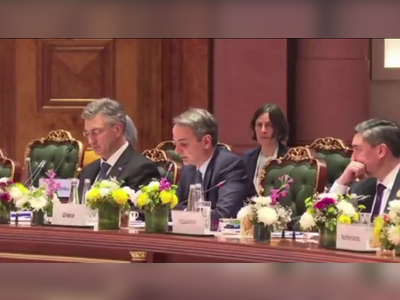
G7 energy, environment leaders haggle over climate strategy
Energy and environment ministers from the Group of Seven wealthy nations met on Saturday in northern Japan, seeking to reconcile the world's heavy reliance on fossil fuels with the urgency of ending carbon emissions to stave off the worst consequences of climate change.
The meetings in the northern Japanese city of Sapporo are aimed at forging a consensus on the best way forward, ahead of the G-7 summit in Hiroshima in May.
“We are facing the challenge of promoting reforms to resolve climate change ... and achieving energy security at the same time,” economy minister Yasutoshi Nishimura told the ministers as the meetings began.
Speaking on the sidelines of the meetings, US Presidential Envoy for Climate John Kerry said the G-7 was “powerfully positioned to be able to lead” in the effort to stem global warming. “We appreciate Japan's leadership and its stewardship of G-7 this year.”
But differences persist over how and how quickly, carbon emissions can be erased, especially at a time when the war in Ukraine has deepened concerns over energy security, complicating that effort.
At the G-7 summit last year in Germany, the countries set a common goal of achieving a fully or predominantly decarbonised electricity supply by 2035.
US officials voiced support for Japan's strategy centring on so-called clean coal, hydrogen and nuclear energy to bridge the transition to renewable energy. Others are pushing for a faster transition to renewable energy.
The head of the United Nations recently called for an end to new fossil fuel exploration and for rich countries to quit coal, oil and gas by 2040. While emissions among the G-7 nations, especially in Europe, have begun falling, they are still rising globally, especially in big, increasingly affluent economies like India and China.
The G-7 nations hope to lead by example, US Energy Secretary Jennifer Granholm said: “We expect that those countries see that this can be done and the nations that have the wherewithal to make these investments to first out give hope to others to be able to do it as the technology lowers the cost.”
The US government's approval of fossil fuel initiatives such as the Willow project on Alaska’s petroleum-rich North Slope has drawn criticism for their environmental impact and for running counter to President Joe Biden’s pledges to cut carbon emissions and move to clean energy.
There's a strong business case for climate-friendly policies, Granholm said, given the estimated €20 trillion global market in clean energy by 2030.
“People see people getting jobs in this area. People who start to drive electric vehicles and don’t need to pay gasoline prices know that it’s much cheaper to drive EVs. It’s all becoming obvious to people," she said while touring the Suiso Frontier, the world's first and only liquid hydrogen carrier, a showcase of the latest technology for what Japan's leaders call a “hydrogen society.”
While Japanese farm fields increasingly are sown with solar panels rather than crops and its gusty coastlines are studded with wind turbines, the country still expects for about 60% of its energy to come from fossil fuels in 2030, with renewables accounting for up to 38%. New fuels and nuclear power would account for the rest.
Meanwhile, Japan is scrambling to protect communities from extreme weather and other impacts of global warming. Sweltering summers, torrential downpours that trigger flooding and landslides, and violent storms have become the norm.
In Sapporo, Japan is seeking an endorsement of its so-called “GX transformation” plan, which its leaders say is designed to foster energy sufficiency and phase out carbon emissions that contribute to global warming.
Legislation yet to be enacted would entail issuing 20 trillion yen (€135 billion) in bonds to help attract 150 trillion yen (€1 trillion) in combined public-private investment in decarbonisation. The law also calls for a carbon-pricing system to make businesses pay for their carbon emissions.
Environmental activists say the plan will keep the country's dwindling nuclear industry on life support while undermining the transition to renewable energy sources.
“As the world tries to overcome two crises of climate and energy, especially in Japan, we need to drastically increase renewables,” said Takejiro Sueyoshi, co-representative of the Japan Climate Initiative, a non-government organization of 768 member companies and organizations.
“Discussions in Japan have gone backwards as if we were in the 20th century. We must smash a wedge into the debate to push it forward rather than backwards,” he said.
The JCI urged the officials meeting in Sapporo to push for more ambitious targets, noting that Canada, Germany, the United Kingdom and Italy already get more of their electricity from renewable sources than Japan’s 2030 target and that despite its own faltering progress toward phasing out fossil fuels, the United States will get most of its electricity from renewable energy by 2035.
“There's no time left. The window for change is closing, but there is still hope. We need to use the sense of crisis as a turning point,” Sueyoshi said.
The G-7 includes Canada, France, Germany, Italy, Japan, the United States and the United Kingdom.
“We are facing the challenge of promoting reforms to resolve climate change ... and achieving energy security at the same time,” economy minister Yasutoshi Nishimura told the ministers as the meetings began.
Speaking on the sidelines of the meetings, US Presidential Envoy for Climate John Kerry said the G-7 was “powerfully positioned to be able to lead” in the effort to stem global warming. “We appreciate Japan's leadership and its stewardship of G-7 this year.”
But differences persist over how and how quickly, carbon emissions can be erased, especially at a time when the war in Ukraine has deepened concerns over energy security, complicating that effort.
At the G-7 summit last year in Germany, the countries set a common goal of achieving a fully or predominantly decarbonised electricity supply by 2035.
US officials voiced support for Japan's strategy centring on so-called clean coal, hydrogen and nuclear energy to bridge the transition to renewable energy. Others are pushing for a faster transition to renewable energy.
The head of the United Nations recently called for an end to new fossil fuel exploration and for rich countries to quit coal, oil and gas by 2040. While emissions among the G-7 nations, especially in Europe, have begun falling, they are still rising globally, especially in big, increasingly affluent economies like India and China.
The G-7 nations hope to lead by example, US Energy Secretary Jennifer Granholm said: “We expect that those countries see that this can be done and the nations that have the wherewithal to make these investments to first out give hope to others to be able to do it as the technology lowers the cost.”
The US government's approval of fossil fuel initiatives such as the Willow project on Alaska’s petroleum-rich North Slope has drawn criticism for their environmental impact and for running counter to President Joe Biden’s pledges to cut carbon emissions and move to clean energy.
There's a strong business case for climate-friendly policies, Granholm said, given the estimated €20 trillion global market in clean energy by 2030.
“People see people getting jobs in this area. People who start to drive electric vehicles and don’t need to pay gasoline prices know that it’s much cheaper to drive EVs. It’s all becoming obvious to people," she said while touring the Suiso Frontier, the world's first and only liquid hydrogen carrier, a showcase of the latest technology for what Japan's leaders call a “hydrogen society.”
While Japanese farm fields increasingly are sown with solar panels rather than crops and its gusty coastlines are studded with wind turbines, the country still expects for about 60% of its energy to come from fossil fuels in 2030, with renewables accounting for up to 38%. New fuels and nuclear power would account for the rest.
Meanwhile, Japan is scrambling to protect communities from extreme weather and other impacts of global warming. Sweltering summers, torrential downpours that trigger flooding and landslides, and violent storms have become the norm.
In Sapporo, Japan is seeking an endorsement of its so-called “GX transformation” plan, which its leaders say is designed to foster energy sufficiency and phase out carbon emissions that contribute to global warming.
Legislation yet to be enacted would entail issuing 20 trillion yen (€135 billion) in bonds to help attract 150 trillion yen (€1 trillion) in combined public-private investment in decarbonisation. The law also calls for a carbon-pricing system to make businesses pay for their carbon emissions.
Environmental activists say the plan will keep the country's dwindling nuclear industry on life support while undermining the transition to renewable energy sources.
“As the world tries to overcome two crises of climate and energy, especially in Japan, we need to drastically increase renewables,” said Takejiro Sueyoshi, co-representative of the Japan Climate Initiative, a non-government organization of 768 member companies and organizations.
“Discussions in Japan have gone backwards as if we were in the 20th century. We must smash a wedge into the debate to push it forward rather than backwards,” he said.
The JCI urged the officials meeting in Sapporo to push for more ambitious targets, noting that Canada, Germany, the United Kingdom and Italy already get more of their electricity from renewable sources than Japan’s 2030 target and that despite its own faltering progress toward phasing out fossil fuels, the United States will get most of its electricity from renewable energy by 2035.
“There's no time left. The window for change is closing, but there is still hope. We need to use the sense of crisis as a turning point,” Sueyoshi said.
The G-7 includes Canada, France, Germany, Italy, Japan, the United States and the United Kingdom.











